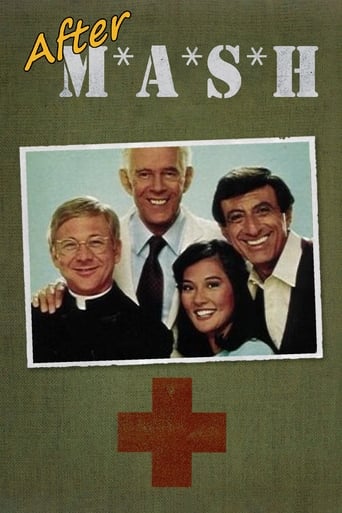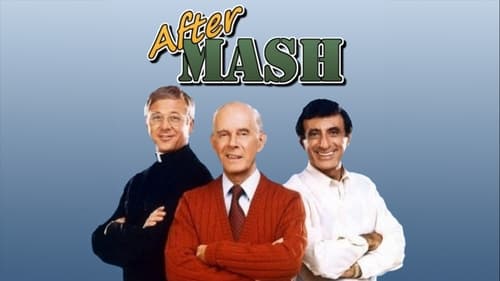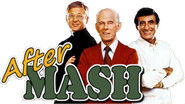feakes
M.A.S.H. dealt with the horrors of war. AFTERMASH dealt with the facts of life about coming home from a war. I always liked Colonel Sherman Potter and wanted to see more of him. but I also wanted Hawkeye and BJ and the others . Considering that Harry Morgan loved playing Sherman Potter so much he wanted to continue playing the role and the same went for Jamie Farr and William Christopher as well. The Stories were puff pieces but they also dealt with real issues as well. Klinger dealing with a crooked Real estate agent who was racist against his wife. Potter and the hospital dealing with the effects of Atomic radiation Among other story lines . I loved it. To me the show made sense after all these people didn't just vanish they had lives before and after M.A.S.H. pretty much like Trapper John Did. But the real sad point is the show suffered from bad timing. Being put up against a Juggernaut like The A-Team did not fare too well for the show. I wish the show would have had years but we are lucky we got what we did. they Say this show was one of the 50 worst ideas in TV history well let me say this . They were wrong. The Show just might be one of the most under rated TV shows in history.
longcleona
I, for one, am tired of "AfterMASH" being the TV industry joke; the joke being that a spin off of a popular series can't survive without major cast members. AfterMASH was a fine series, with Potter, Klinger, and Mulcahy dealing with issues which occur when the bullets stop flying. (Potter fighting the VA to provide disability for a cancer patient who was stationed at A-bomb tests, is just one example.) Viewers finally met Mildred Potter, and were introduced to Bob Scannell, who served with Potter in WWI. Jay O. Sanders (now a semi-big name in movies) played Gene Peiffer, a likable surgical resident whom Potter took under his wing. Mike D'Angelo (John Chappell) was the bumbling administrator, with his aide, Alma Cox (Brendis Kemp), who always locked horns with Klinger. AfterMASH ended it's 1st season ranked #15 in the ratings.So why did this series fail? Two reasons in my opinion, for what it's worth. First, some genius at CBS decided to move the sitcom from MASH's old time slot of Mondays at 9:00, to Tuesdays at 8:00, where it went up against NBC's "The A-Team". AfterMASH didn't stand a chance. Second, the character of Gene Peiffer was written out (with no explanation), to be replaced by Dr. Boyer (played by David Ackroyd). Boyer, who didn't even have a first name, was handicapped, having lost his leg in the Korean War, and lashed out at everyone who thought less of him because of it, at least in his mind. Most viewer, I believe, want characters they can identify with or understand, and a brawling, self-pitying loner with a chip on his shoulder doesn't cut it. In reality, such a person couldn't remain employed in any hospital.AfterMASH will never be a lost classic; rather, it's a what-might-have-been, and television's loaded with them. Still, the show comes up in any TV Guide fall preview that includes a spin-off, with the usual line, "Does anybody remember AfterMASH?"Finally, if there's any spin-off that merits being the industry joke, it's "The Sanford Arms", NBC's ill-fated attempt in 1977 to continue "Sanford and Son" without Fred and Lamont. It ran for 4 episodes. At least AfterMASH made it to 30 before being axed in December, 1984. Eventually, AfterMASH will be released on DVD. After all, shows with fewer episodes are. Glad I won't be trampled in the stampede to buy it.
zacdawac
If I remember this program, the first season was acceptable, though kind of boring, but it did improve as it went along. However, what bothered me, as a writer, is that it took the two truly interesting endings from the two hour final episode of MASH and basically trashed them.For the most part, all of the characters on MASH were leaving Korea on the last episode, and would assume the lives that they left behind, without much deviation. The two exceptions were Klinger, who shocked everyone by remaining in Korea, and Father Mulchachy, who was rapidly losing his hearing after standing on top of an explosion. These were intriguing plot twists, and when MASH ended, the audience was left with the questions of whether or not Klinger would ever leave Korea, and whether Mulchachy would regain his hearing or go completely deaf.The first episode of After MASH quickly resolved both of these cliffhangers in a schmaltzy, unsatisfying way. Klinger was home, and Mulchacy had an operation that immediately restored his hearing. Two cheap cop outs for strong plotlines. The quality of After MASH was not good enough to justify ruining the ending of one of the best television programs in history.
BRWombat
In 1983, the Korean-war comedy/drama series M*A*S*H, which many still consider to be one of the best television shows of all time, ended its phenomenal 11-year run. The following season, After M*A*S*H debuted. The series featured Colonel Potter, Klinger, and Father Mulcahy improbably reunited in a Midwest hospital. (Presumably the series' creators tried and failed to sign other M*A*S*H stars to the lineup.) After M*A*S*H played on the screen exactly as its title suggested -- as a desperate attempt to keep some of the former series' glory alive. Without M*A*S*H's writers, principal stars, dramatic setting -- or ratings -- it died a quick and merciful death



